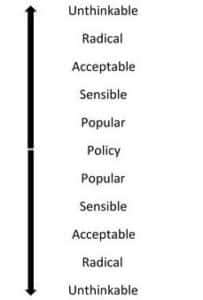News & Insights
Opening the Overton window: consultation and the range of public opinion
Picture this for a moment. Tomorrow morning, you turn on the television and you see the Prime Minister standing at the podium in front of the famous Downing Street door. Naturally, being a politically curious individual you turn the volume up to listen to what he has to say. He begins to speak. “From tomorrow,” he says “There will be no regulations on business. We’re getting rid of them all. Business will be able to do whatever it likes, free of interference from Government.” A silence falls over Downing Street. Did he really say that? “He picks up his folder and steps away from the podium, giving a cheery wave and then disappearing back inside Number 10.
Let’s try that again. The same scene. This time, the Prime Minister steps up to the podium and says “From tomorrow, we will be nationalising all privately owned enterprise.” He waves his hand around “Everything. If it is owned by private citizens, as of tomorrow, it will be appropriated by the state and run as a state enterprise.” He gives a similarly cheery wave and vanishes back into the recesses of Downing Street. The silence that falls is almost deafening.
Either of these expressions would cause a public outcry in the United Kingdom. The PM, it would be concluded, had gone insane. Why is this? In every society, there is an acceptable range of political views and policy positions. This is what has been called by some the Overton Window. It is named after an executive of the Mackinac Center for Public Policy, a conservative think tank in the USA, Joseph P Overton, who asserted that the political viability of any given policy or idea depended primarily on whether it fell into this range.
The idea has been developed further over time, particularly after the death of its progenitor at the young age of 43. It is usually used with reference to the typical Right-Left scale of politics, though versions of it can be adapted for use with reference to other factors. The image to the right is the usual visualisation of this broader scale, with the Overton window being the movable acceptable range of ideas within it. Since its development back in the 1990s, it has been occasionally talked about, primarily in American political circles, but now it’s back in a big way.
Rhion and Elizabeth alluded to the idea in their book The Politics of Consultation, though without naming it:
“Consultation is inevitably affected by the prevailing consensus and it would be almost perverse to see such an exercise occur in defiance of the mood of the moment. Anachronisms emerge, of course, especially in politics… We first began drafting this chapter in 2015. We intended to remark that thirty years of broad agreement on neo-liberal market globalisation was a reality that made it very unlikely that the public in Western democracies would be consulted on any radical alternatives. In the UK context, certain ideas had been unfashionable for decades. Instead, a cosy consensus approved of privatising public utilities, low taxation and economic individualism. Until 2008, nearly everyone also favoured light touch market regulation, though the global financial crash shook public confidence in such certainties.
Had the clock stopped at this point, we would find critics claiming that policies based on this value set had been pushed through without sufficient public consultation. But in truth, politicians offering opinions that went against the grain of that consensus would have experienced severe problems in being taken seriously. The odd one made his mark: Tony Benn from the left. John Redwood from the right. Had they as ministers been overseeing specific issues at particular moments, it is possible that they might have launched consultations that invited the public to consider options outside the mainstream. But they would have been exceptions.
In those days, politicians were under more pressure to conform than we sometimes acknowledge. Although, in theory, we had a plurality of media, the reality was that much of our press and considerable elements of our broadcasters had bought into the established consensus. Few were the occasions where views counter to the prevailing orthodoxy were woven into serious dialogues, A whole range of justified consultations would never have happened.”
So what relationship is there between consultation and the Overton window? As Rhion and Elizabeth suggested, a politician with particularly strong convictions or ideology might plausibly use consultation to try and push the window open a little more widely. If nothing else, consultations could be used to start testing the waters for more radical views. With attention once again coming to the Overton window, with the rise of more populist political views across Europe, could it be that we might start seeing people using public engagement to try to open up debate to positions once considered beyond the Pale?
One of the key principles of the concept was always that change is led not by politicians, but by society. Politicians move to occupy the space, they don’t move the space itself. All over the world though, we have seen changes in political acceptability, driven by politicians and the machinations of their advisors. In the UK, membership of the EU went from being a statistically negligible factor in peoples voting patterns to becoming arguably the most defining feature of them. In America, some of the views being openly expressed by certain senior politicians would once have been roundly decried as objectionable, if not downright obscene. These things didn’t happen by accident.
As we have said previously, consultation can be used to test boundaries, and with a new willingness to test the boundaries of acceptability, might we start seeing something of a self-fulfilling prophecy as consultation is used to push new, more radical ideas dragging open the window as it goes? We live in interesting times, and we probably shouldn’t rule anything out entirely.




